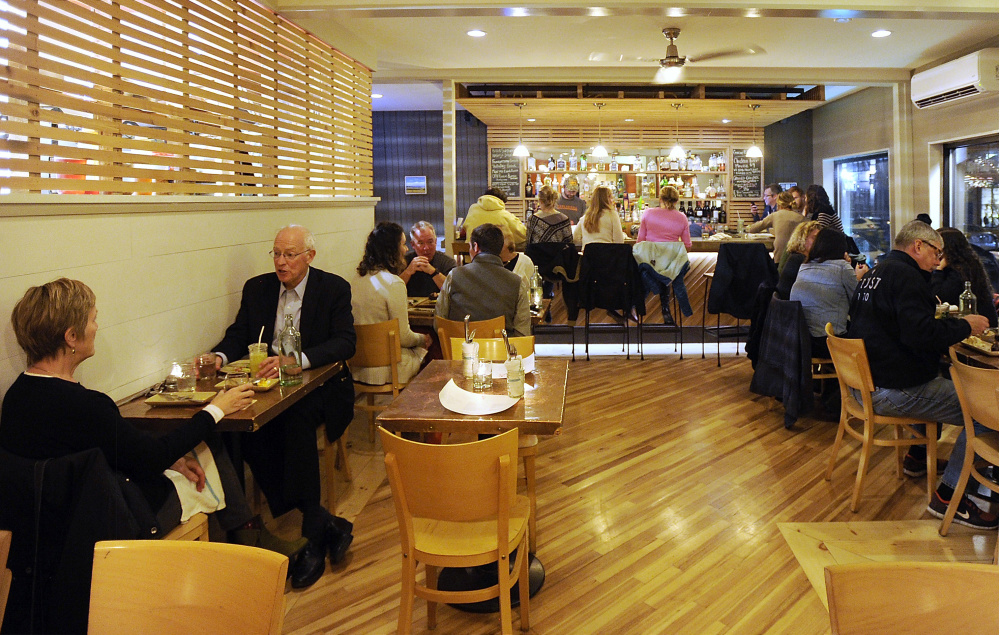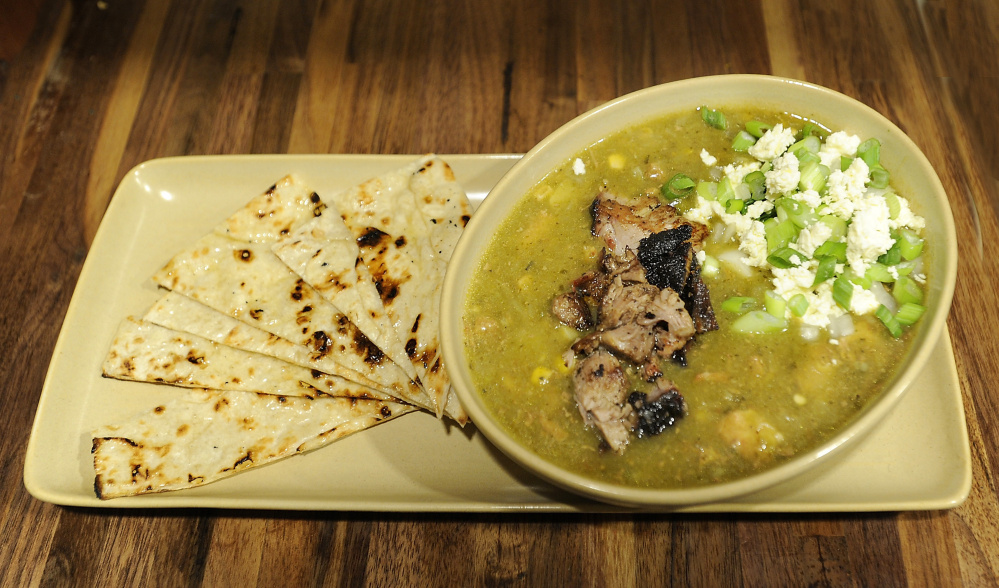It’s not a run-of-the-mill BBQ joint: While this new restaurant at the foot of Munjoy Hill offers at least three types of barbecued meats most nights, it also serves red and green chili, poblano peppers stuffed with dried fruit and rice, ceviche, sautéed shrimp and mushroom empanadas.
It’s not sprawling and oppressively smoky (you won’t have to send your sweater to the dry cleaner after a visit): It’s compact and contemporary and colorful, with seating for about 30 at the copper-topped tables in the dining room, plus room for 10 more on stools that front the well-lighted bar.
And it’s not predictable: There are surprises here, including chef Wilson Rothschild’s memorable twist on pork cracklings and the outrageous chocolate bread pudding that he tops with house-made ice cream.
Terlingua may not be easy to pronounce (“We hear everything from tur-longy to tray-leezha,” a waiter said.) But ter-LING-wah is very easy to enjoy.
Pliny Reynolds and his wife, Melanie Kratovil, opened the restaurant in July on a stretch of Washington Avenue straddling East Bayside and the East End. He’s an architect who practiced in Austin, Texas, designing grocery stores and restaurants around the world. (Reynolds was part of a team that worked on Portland’s Whole Foods Market on Somerset Street.) She’s from a restaurant family: Her grandparents founded and managed Alisson’s in Kennebunkport.
“Our experience in the Southwest convinced us that Portland was ready for a Texas barbecue restaurant with Mexican influences,” Reynolds explains. “We didn’t want to compete in the Old Port, we wanted to do something different that was anchored in a residential neighborhood.” So Reynolds designed the restaurant himself and built it out with help from a friend. Then he moved his family in next door and settled his mother in an apartment upstairs. “We’ve got a little village going on here,” he says with a laugh.
The menu is not extensive, just six starters and six entrees, plus the handful of BBQ specials listed on a board near the front window. And almost every dish is available in a small or large portion. “We didn’t want to call ourselves a small plate restaurant,” Reynolds says, “but we like the idea of sharing and trying. We encourage customers to build their own experience.”
A small portion of the black bean & corn salad ($5) is a fine starter – intensely fresh and bright-tasting, thanks to a generous spritz of lime juice and a sprinkling of cilantro.
And kudos to the kitchen for treating beans with such care: the black beans are tender and creamy, comfort food from south of the border. (The restaurant is named for a Texas ghost town a few miles from the Rio Grande.)
You can’t go wrong with the pork belly chicharron ($9/$14) either. Too often, cracklings are deep fried and greasy, salty nibbles you can’t resist but soon regret. Not at Terlingua. Here the sautéed chicharron is a study in contrasts: crispy, scored skin covering a square of mild, juicy meat that’s drizzled with a fragrant hibiscus-infused honey. Bite into the pork and you can imagine yourself strolling through a market in Mexico (or ordering from a really good food truck). As if to underscore the juxtaposition of textures and flavors, the dish is served with a few leaves of green lettuce, tossed in a light vinaigrette. It tastes absolutely wonderful.
Was the kitchen as deft with other pork dishes? A smoky pork shoulder flavors a green chili studded with scallions, chunks of potatoes and corn, and topped with farmer’s cheese from Winter Hill Farm in Freeport. Terlingua takes chili seriously, roasting about 20 pounds of fresh Anaheims at a time and blending them into a rich vegetable stock for a dish that’s slightly sweet (thanks to the abundant corn) and spiced with plenty of pepper. While this pork was tasty, it could have used salt. There wasn’t any on the table, but our attentive waiter (the staff here is terrific) brought some quickly from the kitchen.
They were out of ribs the night we visited (Pliny Reynolds says, “We run out almost every night … they’re typically gone by 7 p.m.” So we tried the barbecued half-chicken ($17), rubbed with coffee, brown sugar and chili, and smoked for three hours over mesquite and oak. It’s simple and flavorful, not mopped with a heavy sauce (Terlingua offers a spicy vinegar-based sauce and a sweet barbecue sauce on the side) but pleasantly moist and tender. Note to self: next time head over early enough to nab some ribs.
The biggest surprise on the menu was slow-cooked greens ($5) with more of that memorable pork belly. Anyone who’s lived in the South can tell you that greens run the gamut from gray and tasteless to earthy and savory. The greens here aren’t just good – they’re great, with a pleasing mineral taste and a sharp kick, thanks to an enthusiastic splash of spicy, house-made vinegar.
A few things at Terlingua are less than successful. The flatbread offered with the chili and chicken is, well, flat. It’s got good grill marks and a pleasant sheen from a close encounter with honey butter, but the bread itself is lackluster. And the chili wasn’t the only dish that needed more salt.
Desserts, on the other hand, are stellar. Dulce de leche, Latin’s America’s magical, mind-blowing version of caramel, and it’s served here with twists of puff pastry sprinkled with cinnamon and sugar plus a few slices of apple ($6). (It’s billed simply as “Apple Dessert.” Self-delusion perhaps?)
It says something about the dulce de leche that a bowl of bread pudding seemed light by comparison. In actuality, maybe not, but it is exceedingly good: crispy-edged cubes of French bread suspended in a thick custard atop a layer of melted chocolate. It’s served with a caramelized banana and a scoop of fantastically creamy coconut ice cream. If it’s not the sweetest, most soul-soothing dessert you’ve tried this fall, it will certainly come close.
There’s a lot Terlingua is not. But here’s one thing it absolutely is: well worth a visit.
James H. Schwartz has covered food, travel and architecture for The Washington Post, Down East, Coastal Living and Southern Living magazines for more than 30 years. Long a commuter between Portland and Washington, D.C., he retired from his job as vice president at the National Trust for Historic Preservation in 2013 and relocated to Maine.
Copy the Story LinkSend questions/comments to the editors.




Success. Please wait for the page to reload. If the page does not reload within 5 seconds, please refresh the page.
Enter your email and password to access comments.
Hi, to comment on stories you must . This profile is in addition to your subscription and website login.
Already have a commenting profile? .
Invalid username/password.
Please check your email to confirm and complete your registration.
Only subscribers are eligible to post comments. Please subscribe or login first for digital access. Here’s why.
Use the form below to reset your password. When you've submitted your account email, we will send an email with a reset code.